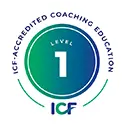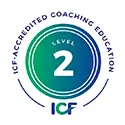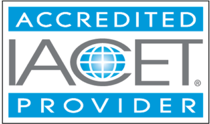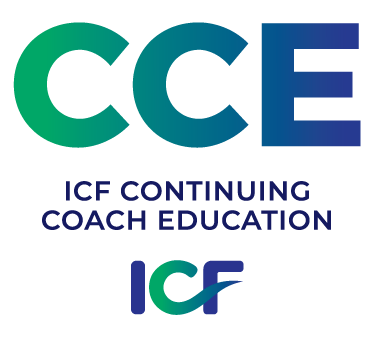FAQs
Frequently Asked Questions about coach training and coaching certification.
1. What are the reasons for so many different places to get certified?
Coaching is one of the fastest-growing industries because the return on investment clearly demonstrates the value. As a result, many different certification programs have sought to meet the demand. Because no regulation exists, it is important to investigate both what is taught in a coach training program and the ability of the instructor to effectively teach the material.
What is the most recognized coaching certification? The International Coaching Federation, ICF, accredits coach training programs based on coaching-specific content. These accreditations are the most recognized world-wide.
The International Accreditors for Continuing Education and Training, IACET, authorizes offering Continuing Education Credits based on quality process for designing and delivering training.
Choosing the right program for you is about choosing what makes sense given your background, experience, budget, time, location, and the training focus on developing the ICF's Core Competencies for a Coach as published by the International Coaching Federation. Of course it also means investigating the quality of the content and training because this is different at each school.
The Center for Coaching Certification offers ICF-accredited Level 1 and Level 2 coach training programs: the Foundational Cohort is Level 1 and supports earning the ACC credential. The Advanced Cohort is Level 2 and supports earning the PCC credential. Within these cohorts, programs include the Certified Professional Coach program, the Certified Master Coach program, the Certified Advanced Coach programs (for Academic Specialist, Addiction Specialist, Business Specialist, Career Specialist, Executive Specialist, Holistic Specialist, Leadership Specialist, Life Specialist, or Wellness Specialist), a 30-hour Coaching Experience class, and the Mentor Coaching. CCC will continue to be there to answer your questions, provide information on the practical aspects of coaching, and support your coaching work. In addition, our graduating coaches have the option of posting a listing on www.FindaCertifiedCoach.com, being available to coach in our coaching firm, Coach-123, writing a chapter in the Coaching Perspectives book series, guest blogging, and guest presenting an online webinar. All graduates are also provided a dashboard they can personalize and use to administer assessments plus the dashboard includes resource materials.
2. What is behind the different accreditations? What is the Center for Coaching Certification’s approach to accreditation?
With so many organizations offering certification, the International Coaching Federation, ICF, has taken the lead to self-regulate the coaching profession. ICF approves or accredits coach training programs and only the ICF credentials coaches as ACC, PCC, or MCC.
The Center for Coaching Certification offers ICF-accredited coaching certification programs that are specifically designed to develop the ICF's Core Competencies. All of the coach training programs are accredited by the International Coaching Federation and support earning a credential.
The Center for Coaching Certification program is accredited by the ICF, and the Center for Coaching Certification is also accredited by the International Association for Continuing Education and Training, IACET, to offer CEUs. Going above and beyond the ICF accreditation is a value add for graduates of the Center for Coaching Certification because the quality is elevated and the hours may also be used as continuing education for renewing other designations.
3. How come the cost varies so much?
Each business offering services chooses what to charge based on their expenses and their desired profits; costs vary because each business chooses their rate.
The Center for Coaching Certification recognizes that the majority of our students are already professionals seeking to enhance their communication and training skills. We dispense with beginner material and cut to the heart of the coaching process with practical, user-friendly, coach trainer-supervised sessions in live, online classes combined with a coaching practicum completed either online or face-to-face, affording us the opportunity to charge less than the majority of coach training programs while emphasizing quality instruction and affording you the opportunity to invest wisely in your continuing education.
The Level 1 Foundational Cohort for earning the ACC credential is $5890 and the Level 2 Advanced Cohort for earning the PCC Credential is $9780. Handouts and class materials are included.
4. What is the reason the amount of time it takes to get “certified” varies so much?
Because coaching remains self-regulated, the gold standard for training hours is the International Coaching Federation, ICF, and they require 60 hours to become a member. Each coach training organization determines whether they will apply for ICF approval, what type of coaching they focus on, and how many hours of training they will offer. All Center for Coaching Certification programs are accredited by ICF.
How long does it take to become a certified coach? ICF membership requires 60 hours. The ACC credential from ICF requires 60 hours of coach training, 100 hours of coaching experience, and 10 hours of mentor coaching. The PCC credential from ICF requires 125 hours of coach training, 500 hours of coaching experience, and 10 hours of mentor coaching. The MCC credential from ICF requires 200 hours of coach training, 2500 hours of coaching experience, and 10 hours of mentor coaching.
The Center for Coaching Certification recognizes that your time is valuable, so the coach training programs are designed to maximize your current education and experience with practical application. Offering Level 1 and Level 2 programs gives you control over your budgeting and schedule to move through training and credentialing. Extensive resources and follow-up information are provided to expand your knowledge and support the career goals you have for your coaching.
For most, earning the ACC credential takes 6 months to one year and earning the PCC credential takes 1 to 2 years. The time is based on more than the training hours and mentor coaching because it also includes gaining the required coaching experience hours.
5. How do I decide which level or cohort to take?
The Foundational Cohort is Level 1 for the ACC and Advanced Cohort is Level 2 for the PCC. Choosing to pursue the ACC or the PCC involves several considerations:
- Level of Credential - The ACC credential requires fewer training hours and fewer hours of experience which means it can be earned in a shorter period of time and with a smaller investment. The PCC credential is increasingly requested or required for coaching leaders and executives. Many start with the ACC and then continue on to the PCC. For those who know they want to coach higher level leaders in the corporate space, the PCC often makes sense plus it is possible to complete the training and mentor coaching for the PCC, then apply for the ACC until you have acquired the coaching experience hours for the PCC.
- Schedule - Because many options are available online, choose a class based on a schedule that works best for you based on work and family commitments.
- Type of Coaching – much like the first few years in college, the initial training is focused on developing your competency as a coach and providing a process. The advanced training includes choosing the designation (much like declaring your major) within the area you plan to coach - a value-add because the focus is on your coaching niche or specialty. While the content for all programs is the same, the focus, discussions, stories, and examples are tailored to the type of coaching. Additionally, when you offer your services, including your niche in your certification designation lets your clients know about your focus.
At the Center for Coaching Certification we encourage you to call and speak with the connection team or coach trainer to gain an understanding of the program and ask questions to ensure that we are the right fit.
6. What if I start a class and then am unable to continue?
Each participant is given up to three months after the last scheduled session to complete the program.
While it is ideal to start and finish with the same group, sometimes things do happen so you can transfer to a different class based on space availability. To transfer to a different class, look at the schedules and verify availability, pay the transfer fee, and let the Center for Coaching Certification know which class you want.
7. Which skills really matter to effectively coach?
The International Coaching Federation, ICF, publishes ICF's Core Competencies for a coach and a Code of Ethics. The Center for Coaching Certification programs are designed to develop and enhance these skills.
An effective Coach establishes trust, co-creates the coaching relationship, listens well, understands how to work effectively with different personalities, utilizes the power of language, asks questions, and adheres to a strict Code of Ethics and the Core Values.
The Center for Coaching Certification masterfully covers each of these topics in the training programs, supporting you both to learn during classes and to apply this knowledge in trainer-supervised coaching sessions during your coaching practicum experience.
8. What is the difference between Life and Executive Coaching?
Coaching is a professional service that offers value both professionally and personally. It is of benefit to people in all walks of life. The process of coaching is consistent across different areas of focus. The areas of focus determine the dominant topic of conversation. There are types and areas of coaching and as you go deeper there are many niche areas within each type and area of coaching. As a starting point, here are a few of the more commonly utilized types of coaching:
- Academic – encompasses various areas of coaching: administrators as leaders, teachers on efficacy, students for results or opportunities.
- Addiction – supports people choosing treatment and successful recovery.
- Business – supports small to mid-sized businesses on growth, stability, scalability, and sustainability.
- Career – focuses on career which can mean starting a career, finding a job, advancing to the next level, changing careers, or retiring from a career.
- Executive – working with professionals in a corporate setting including leaders, high potentials, and executives.
- Health – health coaching includes professionals working in the field and health coaching for the individuals accessing care.
- Holistic – an over-arching term indicating the coaching works with the whole being of a client and may incorporate somatic, gestalt, ontological, or other techniques.
- Leadership – supporting new, emerging, and established leaders in their role.
- Life – addresses personal interests including lifestyle, personal goals, managing ADHD, dating, relationships, grief, relocation, transitions, and more.
- Wellness – encompasses balance, well-being, health, fitness, nutrition, and more.
9. What difference does certification make to me?
Certification offers three key benefits: credibility among your clients and potential clients, coaching knowledge, competency, tools, and support, and professional development. It is a clear demonstration of your commitment to providing quality service.
As with any profession, training makes sense and ensures you have the tools to step up as a certified, professionally trained Coach who supports results for your clients!
Increasingly membership in and credentialing with the International Coaching Federation, ICF, is a determining factor for insurance rates and also for being hired as a coach.
10. How do I know if I would be a good Coach?
If you are asking this question, it indicates you are interested in learning how to be effective, which generally means you can become a good Coach.
The Center for Coaching Certification works with you to identify and develop your coaching skills under the supervision of a professional coach trainer. The programs are designed to develop your coaching competencies and your unique style with coaching processes.
11. Realistically, what are the opportunities for a Coach?
As in any profession, opportunity is based on the possibilities you create through hard work, networking, and results. The good news is that coaching is the second fastest growing profession in the world so the opportunities for coaching inside an organization, in coaching firms, or as a small business owner continue growing too.
The Center for Coaching Certification provides you the tools to coach clients effectively, the resources for business planning, plus resources for marketing and ongoing support to pursue clients in your area of expertise.
12. How long does it take to build a Coaching business?
The amount of time varies based on your efforts, your network, your experience, and your willingness to learn. For some that want to build a Coaching business, it takes a few years because they are doing it part time. Others are successfully meeting their goals within months.
The Center for Coaching Certification offers support through the web-based searchable directory of coaches www.FindaCertifiedCoach.com, the opportunities to get published and present, plus with webinars and monthly calls offering marketing insights and business tips to develop your coaching career goals. The Center for Coaching Certification graduates have the opportunity to sign up with www.Coach-123.com to be available to coach.
13. If I do not want to Coach as a business, what does this program do for me?
Coaching is a core skill for leaders. Additionally, people skills and communication skills are the number one deficiency in the workplace today. This program teaches and enhances these skills, offering you the opportunity to exceed expectations in your career field. Coach training provides you with valuable skills for your career and your life.
The Center for Coaching Certification offers coach training to a vast number of diverse professionals who simply want to enhance their skills, from sales professionals to attorneys and CEOs, from health care professionals to small business owners and NPO employees, from professional trainers or speakers to HR professionals. In short, anyone working in any industry, interacting with people, benefits from the skills developed in coach training.
14. How do I know who the trainer is for the class I want?
The class schedules indicate which trainer is teaching. The team bios are available at About our team
Feel free to call or email and ask too.
The trainers are available to you for a conversation in advance of the class.
15. Where are the classes held?
The Foundational Cohort Level 1 and Advanced Cohort Level 2 are offered completely online. Scheduling programs in your location for your group is an option.
All online classes are live and very interactive. Attendance and participation are required per the International Coaching Federation, ICF, and IACET standards.
16. Are the classes approved by the International Coaching Federation?
Yes – all Center for Coaching Certification programs are accredited by the International Coaching Federation, ICF.
The Foundational Cohort is Level 1
The Advanced Cohort is Level 2
17. How does ICF membership work?
The information on membership in the International Coaching Federation, ICF, is available on their site at http://www.coachingfederation.org
Currently, ICF requires 60 hours of training that meets their criteria plus all members agree to be accountable to the Code of Ethics. They have an annual membership fee.
The credentials ICF awards require training, coaching experience, mentor coaching, assessment of your coaching, and an exam. Credentials must be renewed every three years and that happens by meeting their continuing education requirements.
18. How is ICF membership different from ICF credentialing?
Membership in the International Coaching Federation, ICF, is much like saying you have an associate's degree, and credentialing is much like saying you have a degree, masters degree, or doctorate. If you compare it to other professional membership organizations, the credentialing means advanced levels of both training and experience.
Visit How to Become a Coach for a step-by-step explanation of training, membership, and credentialing.
19. Do training organizations give the membership or credentialing?
The International Coaching Federation, ICF, controls their own membership and credentialing. Training organizations support individuals in completing the ICF requirements to achieve membership and/or a credential. Training programs may or may not be approved by ICF, so it is smart to check first. All Center for Coaching Certification programs are accredited by ICF.
20. What is the difference between an ACTP (formerly) program and an ACSTH (formerly) program? What is Level 1 and Level 2?
A Level 1 program must include 60 hours or more of coach training and 10 hours or more of mentor coaching.
A Level 2 program must include 125 hours or more of coaching training and 10 hours or more of mentor coaching.
The former ACTP programs are now Level 2 programs and package all the training hours and the mentor coaching together, plus you are a student while you are seeking and doing paid coaching work to complete the required coaching hours with your clients.
The former ACSTH accreditation is no longer available. Previously these programs were an affordable a la carte option and helped you to manage your schedule and budget by choosing which segments of the program you enroll in and when you complete them. Now your option is to enroll in partial hours of a Level 1 or Level 2 program if that is offered. At the Center for Coaching Certification you have this option - call 800-350-168 and leave a message or email Team@CoachCert.com for support with this option.
The Center for Coaching Certification is accredited by ICF for Level 1 and Level 2 programs in addition being accredited to offer Continuing Coach Education, CCE, programs.
21. How does ICF credentialing work?
The information on earning a credential with the International Coaching Federation, ICF, is available at www.CoachingFederation.org. More specifically, click for details on the levels of credentialing: the ACC, the PCC, or the MCC. A note: while in coach training, many start with ICF membership while working to earn the ACC or PCC credential.
A clear explanation with infographics is available at How to Become a Coach
22. How long between the CPC and the CMC classes?
If you enroll in partial hours, the CPC is the first step. How quickly you advance to the CMC is up to you - in the cohorts you move from one to the next. Some go straight from the CPC into the CMC while others wait between classes. In the Foundational Cohort Level 1 and Advanced Cohorts all programs are pre-scheduled.
Typically, the considerations include time and budget.
It is important to note that both the CPC and the CMC programs are required for International Coaching Federation membership. ICF membership is a minimum standard today for individuals marketing themselves as a coach.
23. What is the difference between CPC, CMC, CCS, ACC, PCC, and MCC?
- CPC = Certified Professional Coach
- CMC = Certified Master Coach
- CCS = Certified Advanced Coach which covers the following:
- CAC-AS = Certified Advanced Coach – Academic Specialist
- CAC-BS = Certified Advanced Coach – Business Specialist
- CAC-CS = Certified Advanced Coach – Career Specialist
- CAC-ES = Certified Advanced Coach – Executive Specialist
- CAC-LS = Certified Advanced Coach - Leadership Specialist
- CAC-LS = Certified Advanced Coach – Life Specialist
- CAC-WS = Certified Advanced Coach – Wellness Specialist
These are certifications through the Center for Coaching Certification.
- ACC, PCC, and MCC are credentials earned through the ICF.
24. What language are the programs offered in?
The Center for Coaching Certification programs are all offered in English unless otherwise noted.




